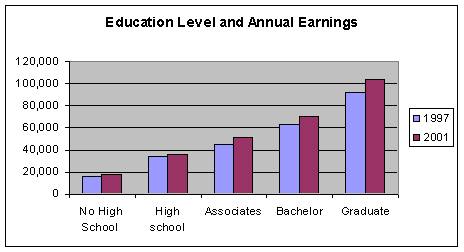This is an excellent question. Simply put, it is very important to develop job skills. No skills equal few jobs; few job opportunities equal lower earnings, etc. One obvious way to obtain skills in an environment of rapid technological change and increased global competition is to get an education:
“Innovations in the workplace are changing the demand for the types of skills needed on the job, which in part explains the differential effects on workers. For example, evidence tells us that the returns from investments in higher education for workers in the U.S. have risen.” (San Francisco Federal Reserve 2003 Annual Report)
A recent FRBSF Economic Letter by Valletta and MacDonald (2004) found, “…that workers who use computers earn more than otherwise similar workers who do not. We also find that this effect has been especially large for highly educated workers in recent years.”
Value of an education
So what’s the value of an education? As is illustrated in Chart 1 annual earnings increased dramatically as the level of education rose; and those differences widened noticeably from 1997 to 2001. Let’s compare median wages in 2001. Individuals with a high school diploma earned a median income of $36,055, those with a bachelor’s degree earned a median income of $72,284, whereas individuals with a graduate degree earned $105,320.
Chart 1

Is the cost of an education really worth it?
In 2004 college tuition is on the rise and state budgets across the country have made drastic cuts to funding for higher education. Compare the rising costs of an education with the opportunity cost, i.e. the amount of money a student could have made had they entered the workforce immediately after high school, and many high school students may be left wondering if an education is really worth the time and effort. To provide perspective on college education costs, here is one simple comparison using Census Bureau data to compare the disparities between educational levels and lifetime earnings:
- High school grads will earn $1.2 million
- Bachelor degree holders will earn $2.1 million, and
- Professional degree holders will earn $2.9 million.
Note: Example does not account for the time value of money.
To remain skilled, education must remain dynamic
According to a recent report (Cantu, Rene, “What is the Value of an Education,” Texas Labor Market Review, 12/2003); our society is better educated than ever before. Eighty-four percent of adults 25 years or older completed high school. Twenty-six percent hold bachelors degrees. Compare these levels of education to those 30 years ago, when only 63 percent of adults had a high school diploma and only 14 percent obtained bachelors degrees. The difference is dramatic. However, even as our society becomes more educated, some workers are seeing their industries phased out and their skills left behind. The only way to stay ahead of this trend is for workers to continue to educate themselves. In Chairman Greenspan’s testimony before the House of Representatives in March of 2004, he states….
But for the past twenty years the real incomes of skilled, especially highly skilled, workers have risen more than the average of all workers, whereas real wage rate increases for lesser-skilled workers have been below average, indeed virtually nonexistent. This difference in wage trends suggests that, at least in relative terms, we have developed a shortage of highly skilled workers and a surplus of lesser-skilled workers.
The workplace is more competitive then ever and changes on a seemingly daily basis. In the May 21, 2004 FRBSF Economic Letter, “Globalization, Threat or Opportunity for the U.S. Economy,” former San Francisco Reserve Bank President Robert T. Parry writes: ”The demand for highly skilled workers continue to outweigh the supply and with the growing trend to out source work, the workforce has been left with many once skilled workers unskilled in a fast changing economy.” To adjust to this rapidly changing environment more and more workers are choosing to return to school to upgrade or improve their skills and earning capacity. Concluding his Economic Letter, President Parry notes:
…Education is the bedrock of America’s edge in technology and productivity. It’s the key to producing workers with the flexibility to learn new skills as market conditions evolve.
Additionally, in the July 23, 2004 FRBSF Economic Letter, Valletta and MacDonald state:
“Our findings confirm that workers who use computers earn more than otherwise similar workers who do not. We also find that this effect has been especially large for highly educated workers in recent years.”
In summary, although the workforce faces a continually changing environment and college is becoming increasingly expensive, the long-term benefits of an education still outweigh the short term costs.
References
Federal Reserve Bank of San Francisco, 2003 Annual Report.
“Globalization: Threat or Opportunity for the U.S. Economy,” Robert T. Parry. FRBSF Economic Letter 2004-12, May 21, 2004.
Testimony of Chairman Alan Greenspan before the Committee on Education and the Workforce, U.S. House of Representatives March 11, 2004.
“The Computer Evolution,” Rob Valletta and Geoffrey MacDonald, FRBSF Economic Letter 2004-19; July 23, 2004.
U.S. Census Bureau: Money Income of People, September, 2002 Available as: HTML or PDF
“What is the Value of an Education?” Rene Cantu. Texas Labor Market Review, December 2003.
- Dr. Econ: February 2003 “What effects do recessions have on college students?”
- Econ Ed and the Fed: Spring 2004 “Monetary Policy: It Matters to You!”